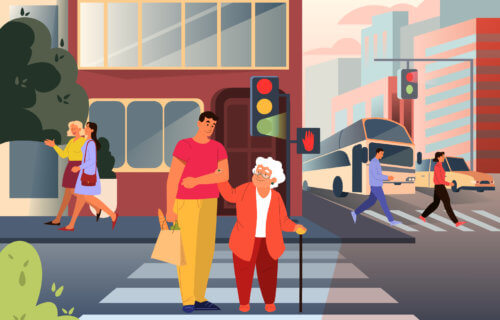AUSTIN, Texas — A new study finds that it really is the thought that counts when people do good deeds. Researchers from the University of Texas at Austin have found that people who carry out random acts of kindness underestimate how much their actions affect the recipient.
Not only does the recipient of a good deed generally feel more positive after these interactions, the study found that they also spread this kindness and generosity to others.
Researchers Amit Kumar from the McCombs School of Business and Nicholas Epley from the University of Chicago discovered that good deed “performers” often underestimate how much better recipients feel after their acts. They typically focus on the object or service they’re providing — such as giving a gift or helping someone cross the street.
However, the study finds recipients focus more on the feelings of warmth the act evokes. Simply put, recipients of an act of kindness care more about the thought someone put into this gesture, rather than the gift itself.
“Performers don’t realize how much of an impact they’re having on people through their kindness, and that can stand in the way of these behaviors,” Kumar says in a media release.
Good deeds significantly boost positivity
The study authors tried to quantify how big of a boost random acts of kindness give to the people who receive them. In a series of experiments, they had both the performer and the recipient fill out a questionnaire after a good deed.
In one experiment, a group of MBA students performed two random acts of kindness over a two-day period without expecting anything in return. These included paying for a stranger’s lunch at a café or helping a friend with a difficult task.
The questionnaire examined what performers and recipients thought the recipient’s mood would be after this act of kindness, using a scale of -5 (much more negative) to 5 (much more positive). Results show performers thought recipients were at a 2.32 on the mood scale. However, recipients gave themselves an average of 3.55.
“Both performers and recipients were in better moods after,” Kumar says. “But it was clear that performers underestimated the value of their actions.”
In a second experiment, the team gathered 84 volunteers in Chicago’s Maggie Daley Park. Each participant had the option to give away a cup of hot chocolate to a stranger or keep it for themselves. Seventy-five of the 84 participants chose to give the drink to a stranger.
Again, performers underestimated the emotional impact of their actions. On average, they expected the recipients to have a mood boost of 2.7, but the recipients reported that their mood rose to 3.5.
“People aren’t way off base,” Kumar reports. “They get that being kind to people makes them feel good. What we don’t get is how good it really makes others feel.”
Random acts of kindness are contagious
Another experiment by the team gathered 200 people, splitting them into two groups of 100. One group had 50 people receive a cupcake for participating while the other 50 rated how they thought that person felt about receiving this gift.
In the other group, 50 people gave a cupcake away to a stranger while the other 50 rated the moods of both people — the performer and the stranger receiving the cupcake. Results show the graders rated the happiness of the recipients about the same, regardless of whether they received the treat through an act of kindness or not.
However, recipients who received a cupcake through an act of kindness reported being happier than control group recipients.
“Performers are not fully taking into account that their warm acts provide value from the act itself,” Kumar explains. “The fact that you’re being nice to others adds a lot of value beyond whatever the thing is.”
In their final lab experiment, the team found that kindness can be contagious, as recipients of random good deeds tend to “pay it forward” to others later on.
Before playing a game, participants either received a gift from the lab store or received a gift from another participant in the experiment. They then had to divide $100 between themselves and the other players.
Participants who received their gift from another person ended up sharing more of the cash ($48.02) than those who got their gift from the store ($41.20).
“It turns out generosity can actually be contagious,” Kumar concludes. “Receivers of a prosocial act can pay it forward. Kindness can actually spread.”
“Positive interpersonal contact is a powerful source of happiness. It will make you feel better and someone else feel better, even better than you think they’ll feel. A little good doesn’t just go a long way — it goes an unexpectedly long way.”
The study is published in the Journal of Experimental Psychology: General.

